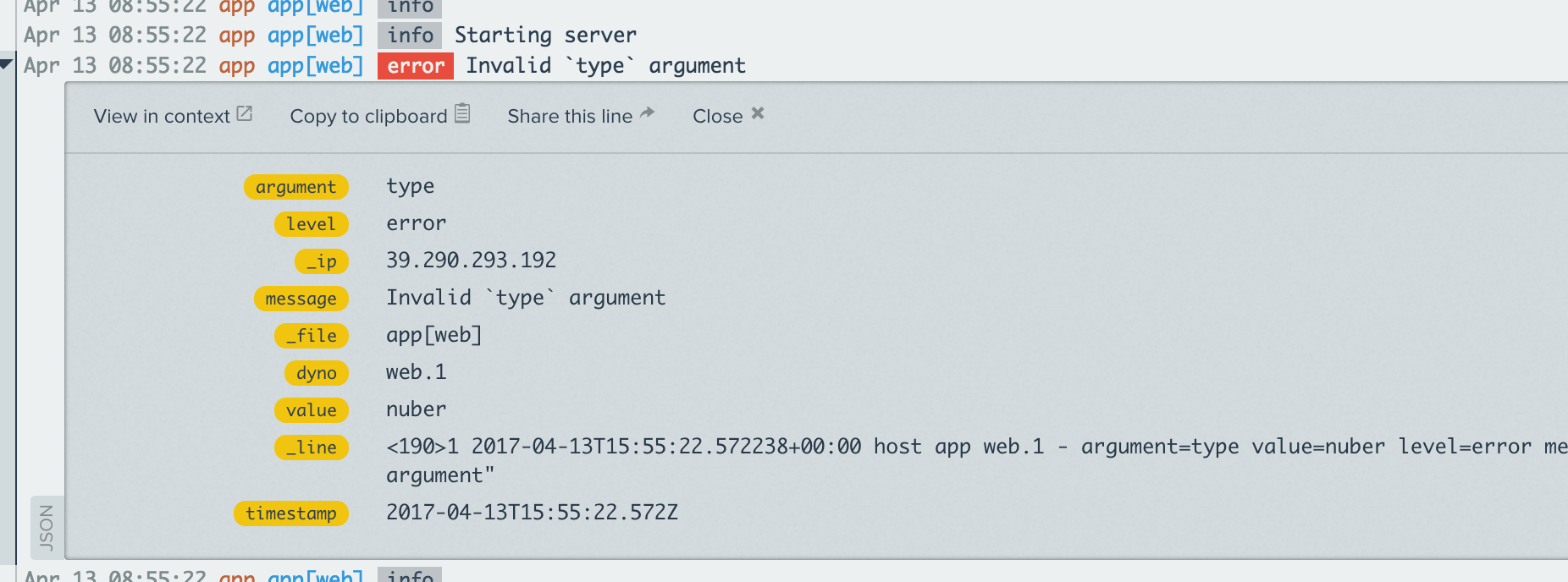ianstormtaylor / Heroku Logger
Programming Languages
Projects that are alternatives of or similar to Heroku Logger
heroku-logger
A dead simple logger, designed to be perfect for Heroku apps.
Features
- No configuration necessary—with sane defaults based on your
NODE_ENVandLOG_LEVELenvironment variables. - Matches Heroku's own logfmt formatting syntax in production.
- Makes your logging nice and easy to read in development.
Example
Given an API which is what you'd expect...
const logger = require('heroku-logger')
logger.info('Starting server', { port: 4000 })
logger.error('Invalid `type` argument', { argument: 'type', value: 'nuber' })
In development, it outputs an easy to read version...
But in production, it omits the junk, since Heroku handles that for you, and simply outputs the data in logfmt...
In any add-ons attached to your Heroku log drain, the metadata will be picked up automatically...
That's it!
Why?
There are lots of Node.js logging packages—simple ones that basically just print strings to the console, and complex ones like Winston or Bunyan which give you fine-grained control.
But none that were a one-liner for Heroku apps, with sane defaults.
Heroku already handles all of the logging issues that complex libraries solve—timestamping, process-stamping, log draining, performance, etc. So the complex libraries are just extra configuration for no gains.
But the one thing that no logger handled nicely was matching Heroku's logfmt formatting out of the box. By using logfmt for your application logs, you get a consistent output for everything, so any consumers of the Heroku log drains can automatically parse them, because they're in the same format.
API
const logger = require('heroku-logger')
logger.info('message', { key: 'value' })
[info] message key=value level=info message=message
The package exports the one-liner logger singleton as the default, which is already instanciated with sane defaults using the LOG_LEVEL and NODE_ENV environment variables.
new Logger(options)
const Logger = require('heroku-logger').Logger
const logger = new Logger({
color: Boolean, // Defaults to `true` only if `NODE=ENV != 'production'`.
delimiter: String, // Defaults to `'#'`.
level: String, // Defaults to `LOG_LEVEL` if set, or `'info'`.
prefix: String, // Defaults to `''`.
readable: Boolean, // Defaults to `true` only if `NODE=ENV != 'production'`.
})
But if you need to create multiple instances, which can be useful for subclassing loggers based on the parts of your system, the Logger constructor is also exported, which takes the following options:
-
colorsets whether to log in colors, for easier scanning. -
levelsets the current log threshold, silencing logs that don't meet it. -
delimitersets the delimiter to use for nested data keys. -
prefixsets a string that will be prepend to every message. -
readablesets whether to log themessageseparate from thedata.
logger[level](message, data)
logger.info('message', { key: 'value' })
logger.error('error!', { code: 400 })
[info] message key=value level=info message=message
[error] error! code=400 level=error message=error!
Log a message with data to the console at level, where level is one of:
debuginfowarnerror
You can also pass an Error object as a message, in which case the logger will automatically convert it into useful message and data with a full stack trace.
logger.log(level, message, data)
logger.log('info', 'message', { key: 'value' })
[info] message key=value level=info message=message
Log a message with data to the console at level.
logger.clone(options)
const other = logger.clone({ prefix: '[package] ' })
other.info('message', { key: 'value' })
[info] [package] message key=value level=info message=message
Create a new Logger instance, copying the existing loggers config, but extending it with optional options.




